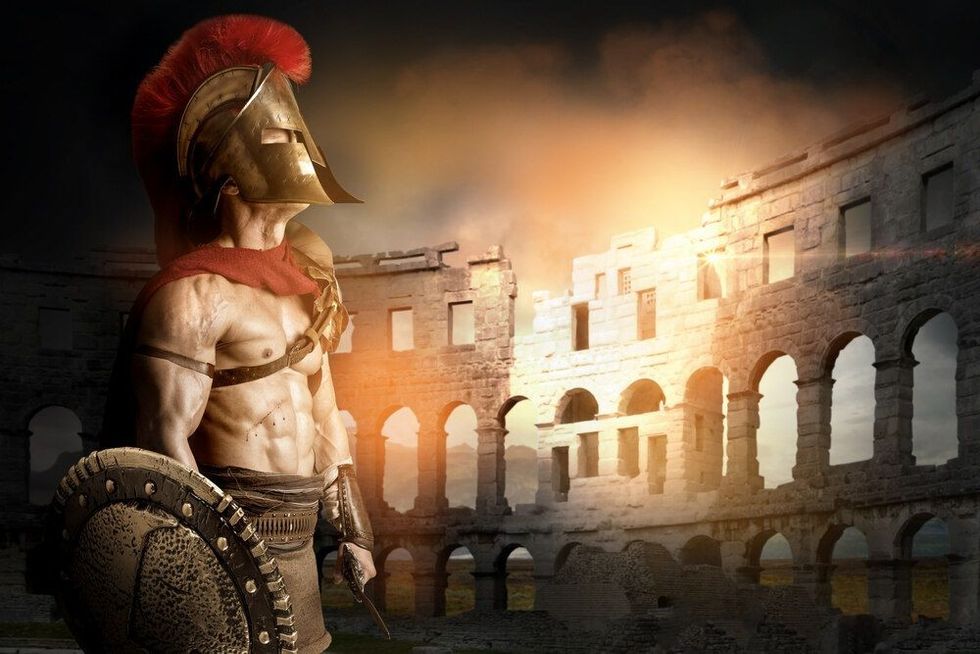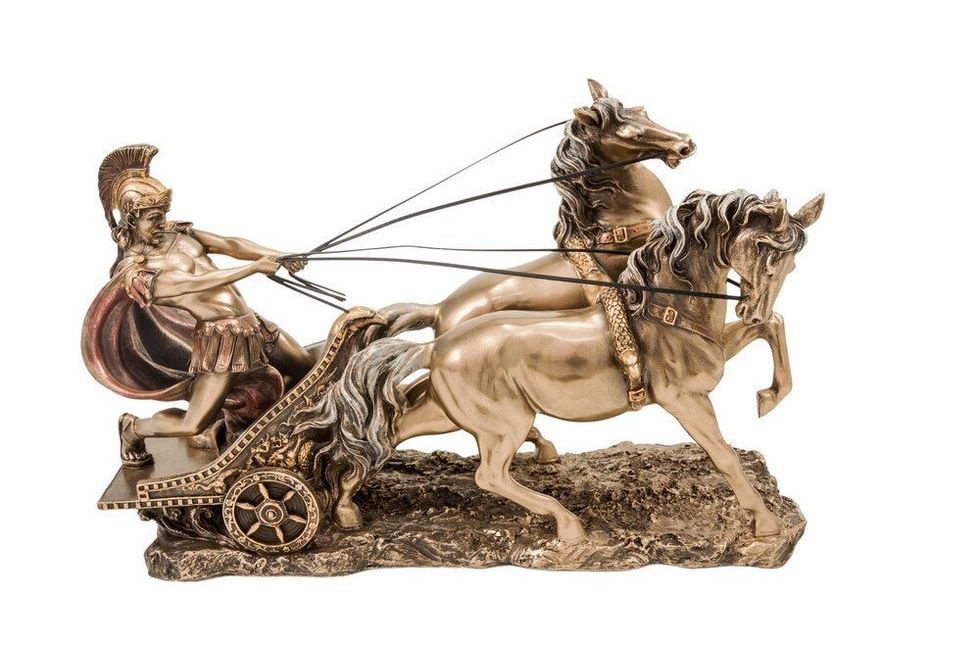A gladiator is a skilled swordsman who is an armed combatant appointed for entertaining the royals and the audiences in the Roman Republic and the Roman Empire.
They would have to face very violent confrontations with other gladiators, condemned criminals, and even wild animals. Some of them volunteered to risk their lives by appearing in the arenas to entertain the spectators.
However, many warriors who were forced into the profession after being captured in war were despised and treated like slaves. They were not only schooled and trained under extreme conditions but also socially marginalized and segregated even after death.
Despite their origin, gladiators were the prime examples of Roman martial ethics. In fighting fiercely or dying well, they were admirable symbols of bravery and valor. There were mainly four types of gladiators: Thraex, Samnites, Retiarius, and Myrmillo.
For nearly a thousand years, the gladiator games had lasted till they declined in the fifth century after the adoption of Christianity by the state church of the Roman Empire. The gladiators have been immortalized high and low in art.
There were countless people who would choose to be a gladiator because of fame and glamor. Despite the short life because of their bloody profession, being a gladiator was considered one of the most high-profile professions in ancient Rome.
Gladiator battles drew thousands of people from all walks of life, including royals. It was one of the chief forms of entertainment for the people of ancient Rome.
Gladiators are also widely popular and have been represented in popular cultures such as films and TV series. They have also been inculcated into fashion with the iconic gladiator-style boots, which are very much in vogue. If it is gladiator names you seek, this list has plenty.
Why not also take a look at Sword Names and Ancient Latin Girls' Names?
Famous/Historical Gladiator Names

Here's a list of the famous gladiator names from history and pop culture.
1. Carpophorus (M) (Greek origin) meaning "fruit bearer". Carpophorus is not a Roman gladiator in the true sense, but a bestarii. He specialized as a fighter was pitted against animals, but this makes his feat no less legendary and deserving to be on this list.
2. Commodus (M) (Latin origin) meaning "suitable", "convenient", or "opportune". Commodus was a Roman emperor who fought in the arena with the gladiators and was known to fight in unfair matchups with weaker opponents. He had a huge ego and regarded himself as quite the warrior.
3. Crixus (M) (Gaulish origin) meaning "one with curly hair". Crixus was a famous gladiator known to be the right-hand man of Spartacus. He was involved in the Gladiator war against the Roman Empire.
4. Flamma (M) (Unknown origin) meaning "the flame" was one of the most formidable and capable gladiators. Originally from Syria, was a soldier in the Syrian army who was later captured, condemned, and forced to fight in the arenas as a Gladiator in Ancient Rome.
5. Hermes (M) (Greek origin) meaning "god of good luck"; a skillful fighter in ancient Rome mentioned in the poems of a contemporary Roman poet called Martial. He was well trained and superior to most other gladiators.
6. Marcus Attilius (M) (Roman origin) meaning "Mars". Marcus Attilius was one of the many who chose to become a gladiator on their own accord rather than slavery in ancient Rome.
7. Mevia (F) (Roman origin) meaning unknown, was the most famous ancient Roman gladiator amongst the very rare female gladiators. She was more of a venatore who fought animals rather than people.
8. Priscus (M) (Latin origin) meaning "ancient", one of the two ancient roman gladiators who are famous for their unforgettable battle between Priscus and Verus in which neither could get the upper hand. They were both awarded freedom by the emperor of the time Titus. The latter presented them with a Rudis that gained them their independence.
9. Prudes (M) (Latin origin) meaning "proud"; one of the most famous Roman gladiator names of a famous gladiator who was known for his epic battle against Tetraites.
10. Spartacus (M) (Latin origin) meaning "from the city of Sparta" was the most famous gladiator of ancient Rome and perhaps the greatest gladiator whose story has been told and retold throughout the ages. He led many battles against Roman soldiers and had emerged victorious.
11. Spiculus (M) (Latin origin) meaning "ear of grain", was one of the ancient Roman famous gladiators who fought to win many battles in the amphitheater.
He had built a close relationship with Roman Emperor Nero, who awarded him riches and rewards because of his courage. Later, he was asked by Emperor Nero after his downfall to kill him, to which he refused.
12. Tetraites (M) (Roman origin) meaning unknown. He is one of the many famous gladiators known for his battles with another gladiator named Prudes.
13. Verus (M) (Latin origin) meaning "a true one"; one of the many famous gladiators of the who was famed for his battle with Priscus which had led to both parties winning a Rudis from Emperor Titus, which is a wooden sword that symbolized a gladiator's freedom.
Male Gladiator Names

Here's a list of popular male gladiatorial names that resonate with strength and bravery.
14. Acidus (Latin origin) meaning "I am sour."
15. Armipotens (English origin) meaning "powerful."
16. Asper (American origin) meaning "hope answered."
17. Asprinus (Latin origin) meaning "peace."
18. Atrox (Latin origin) meaning "savage and bloody" or "cruel."
19. Audacius (Latin origin) meaning "courageous" or "brave one."
20. Audax (Latin origin) meaning "daring."
21. Bellicus (Celtic origin) meaning "strong" or "powerful."
22. Belliger (Latin origin) meaning "bringer of war."
23. Caldus (Latin origin) meaning "rashness." A common Roman name.
24. Celer (Roman origin) meaning "speed." A great Roman name.
25. Celerianus (Roman origin) meaning "one who is fast." A wonderful Roman name for quick-stepped gladiators.
26. Celerius (Roman origin) meaning "agility."
27. Citatus (Latin origin) meaning "an agile person."
28. Citior (Latin origin) meaning "with a lot of speed."
29. Citus (Latin origin) meaning "one with speed."
30. Durus (Latin origin) meaning "hard" or "fast".
31. Excitatus (Latin origin) meaning "to awaken".
32. Exitiosus (Latin origin) meaning "rouse."
33. Ferocianus (Latin origin) meaning "ferocious." A fitting Roman name for gladiators with ferocity.
34. Ferox (Latin origin) meaning "fierce", "untamable" or, "warlike."
35. Ferullus (Latin origin) meaning "as strong as iron."
36. Frontosus (Latin origin) meaning "one who charges ahead."
37. Funestus (Latin origin) meaning "calamitous", "deadly" or, "fatal."
38. Imperiosus (Latin origin) meaning "imperious" or "domineering."
39. Importunus (Latin origin) meaning "suitable or timely."
40. Incitatus (Latin origin) meaning "swift."
41. Iniuriosus (Latin origin) meaning "harmful."
42. Malus (Latin origin) meaning "evil."
43. Mordax (Latin origin) meaning "biting" or "snappish". For cool gladiator names, this is perfect.
44. Nocentianus (Latin origin) meaning "determined killer" or "fierce warrior."
45. Pollentius (Latin origin) meaning "one who has power."
46. Potens (Latin origin) meaning "powerful", "to confer potency."
47. Potentinus (Latin origin) meaning "one who has strength."
48. Properatus (Latin origin) meaning "to hasten."
49. Rapidus (Latin origin) meaning "swift and fierce."
50. Robaratus (Latin origin) meaning "one with strength."
51. Roburius (Latin origin) meaning "one with strength and fury."
52. Robustianus (Latin origin) meaning "muscular and strong."
53. Strenuus (Latin origin) meaning "vigorous."
54. Tetricus (Latin origin) meaning "sullen."
55. Torentius (Latin origin) meaning "a treacherous river."
56. Valentinus (Roman origin) meaning "healthy and strong."
57. Validus (Latin origin) meaning "strong and powerful."
58. Vegetianus (Latin origin) meaning "one with immense power."
59. Vegetinus (Latin origin) meaning "powerful one."
60. Vegetius (Latin origin) meaning "powerful and muscular."
61. Vegetus (Latin origin) meaning "power" or "strength."
62. Vehemens (origin) meaning "emphatic", "vigorous" or, "lively."
63. Velocianus (Latin origin) meaning "rapid" or "fast."
64. Velox (Latin origin) meaning "swift."
65. Vigor (English origin) meaning "physical strength and good health."
66. Violens (English origin) meaning " destructive action."
67. Viratus (Latin origin) meaning "strong" or "virility."
68. Virilianus (Latin origin) meaning "manly" or "energetic."
69. Volantius (Latin origin) meaning "flying."
Female Gladiator Names
Although female gladiators were a rarity, they weren't non-existent. Here's a list of popular names for a female gladiator.
70. Aspra (Italian origin) meaning "unpleasant" or "disagreeable."
71. Asprilla (Unknown origin) meaning "harsh" or "cruel."
72. Audacia (Latin origin) meaning "boldness" or "courage."
73. Bellica (Latin origin) meaning "warfare" or "military."
74. Bellicina (Latin origin) meaning "female warrior."
75. Celeriana (Latin origin) meaning "a speedy woman."
76. Cita (Latin origin) meaning "a woman with agility."
77. Citata (Latin origin) meaning "an agile warrior."
78. Excitata (Latin origin) meaning "fatally spreading disease."
79. Ferocia (Latin origin) meaning "one who is cruel" or "violent."
80. Ferociana (Latin origin) meaning "a savage woman."
81. Ferocilla (Latin origin) meaning "small but ferocious."
82. Ferocina (Latin origin) meaning "a ferocious female warrior."
83. Fervida (Latin origin) meaning "boiling hot."
84. Fervidia (Latin origin) meaning "a fiery and angry woman."
85. Importuna (Latin origin) meaning "persistent" or "cruel".
86. Incitata (Latin origin) meaning "fast-moving", "aroused" or, "passionate."
87. Mala (Latin origin) meaning "dreadful" or "terrible."
88. Malificia (Latin origin) meaning "evil."
89. Nerviana (Sanskrit origin) meaning "bliss" or "liberation."
90. Nervilla (Latin origin) meaning "tough and small."
91. Periculosa (Latin origin) meaning "dangerous".
92. Potentia (Latin origin) meaning "force", "might", "power" or, "ability."
93. Potentilla (Latin origin) meaning "a powerful female."
94. Potentina (Latin origin) meaning "a strong woman warrior."
95. Strenua (Roman origin) means "Goddess of the new year, well-being and purification." A great Roman name for healthy gladiators.
96. Tetricilla (Unknown origin) meaning "a harsh and cruel woman."
97. Valentia (Latin origin) meaning "a powerful female."
98. Valentilla (Latin origin) meaning "a healthy and strong woman."
99. Valentina (Latin origin) meaning "a muscular and powerful female with a lot of strength.
100. Violentilla (Latin origin) meaning "small in stature but violent in nature."
Kidadl has lots of great names articles to inspire you. If you liked our suggestions for Gladiator Names then why not take a look at Unisex Latin Names, or for something different take a look at Funny Fortnite Clan Names.










